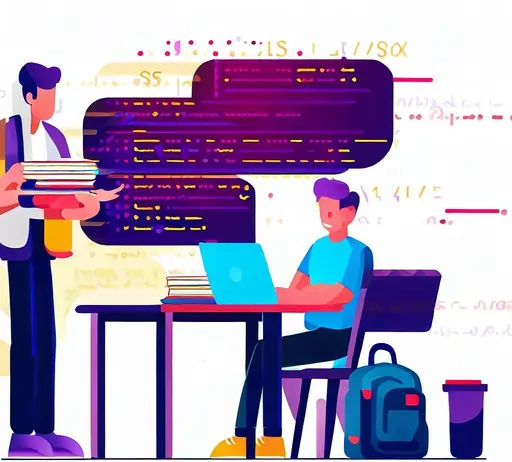Enhancing Problem-Solving Skills
Problem-solving abilities can be improved through programming assignments. They help students apply programming ideas in actual situations by bridging the gap between theory and practice. The ability to analyze problems and approach problem-solving systematically is developed in students by breaking complex problems down into manageable tasks.

Applying Theoretical Concepts in Practice
Programming assignments are essential for translating abstract ideas into real-world contexts. While reading about programming concepts in textbooks or in the classroom can give students a basic understanding, assignments give students the chance to put these concepts into practice. Students' understanding of the fundamental concepts and problem-solving abilities are strengthened by applying solutions to specific problems.
Assignments force students to dissect difficult issues into more manageable parts, which encourages analytical thinking and a methodical approach to problem-solving. Students can use this process to pinpoint important elements, examine their relationships, and come up with workable solutions. Students who engage in this analytical process repeatedly gain critical thinking abilities that are useful in programming as well as many other academic and professional fields.
Programming assignments also foster innovation and creativity. Students are urged to consider various approaches to problem-solving, think creatively, and create original solutions. These opportunities for experimentation foster a productive learning environment where students take responsibility for their work and grow passionate about programming.
In general, programming assignments act as a link between conceptual understanding and real-world application. They give students the freedom to put concepts into practice, hone their problem-solving skills, and unleash their creativity, reinforcing their learning and preparing them for programming challenges in the real world.
Encouraging Analytical Thinking
Students are frequently required to divide difficult problems into smaller, more manageable tasks for programming assignments. Students must identify the essential elements of a problem, evaluate how they relate to one another, and develop an effective solution strategy during this process, which develops analytical thinking. Students who engage in this analytical process repeatedly gain a structured problem-solving method that is useful in programming as well as many other facets of their academic and professional lives.
Fostering Creativity and Innovation
Programming assignments offer students a fertile environment for encouraging innovation and creativity. These tasks give students the freedom to experiment with different approaches to problem-solving, encouraging them to think outside the box. Programming assignments encourage students to think creatively by pushing them to develop original solutions and try out new methods.
Students are given the freedom to push the boundaries of their programming knowledge and investigate new options through assignments. They are urged to come up with novel solutions to issues, increase the effectiveness of their code, and enhance user experiences. Their technical skills are improved, but this process also fosters a sense of pride and ownership in their work.
Additionally, programming assignments foster a culture that respects originality and innovation. Students are motivated to participate in discussions that encourage creativity, to collaborate with peers, and to share their ideas. Programming assignments stoke students' enthusiasm for programming and instill confidence in their capacity to handle challenging problems by giving them a stage on which to demonstrate their inventive problem-solving skills.
Programming assignments ultimately foster a mindset of curiosity, exploration, and innovation in addition to the development of technical skills. These tasks encourage creativity, preparing students to be flexible and resourceful problem solvers in the dynamic field of programming.
Reinforcing Concepts and Retention
Assignments involving programming are an effective way to reinforce ideas and encourage memory retention. By using them in real-world situations, they give students the chance to solidify their understanding of programming concepts. Through assignments, students review and solidify the ideas discussed in lectures, improving their understanding of the material. Assignments also assist students in identifying knowledge gaps that may exist, encouraging further research and clarification. Students gain important research skills that aid in long-term retention by conducting independent research and self-learning. Assignment completion also improves students' critical thinking and problem-solving abilities, ensuring that they not only learn the material but also retain it and use it successfully in the future.
Consolidating Knowledge
Assignments involving programming are a great way to reinforce concepts learned in lectures or from reading. When students work on assignments, they review the theories, procedures, and methods covered in class, solidifying their comprehension of the material. The knowledge is solidified and connections between various programming concepts are created during this reinforcement, which is essential for long-term retention.
Identifying Knowledge Gaps
Assignments also serve as diagnostic tools that show students where they might be lacking in understanding. Students may discover that they are unclear about a certain concept or find it difficult to apply it in a practical way when they are presented with a programming problem. These epiphanies provide students with useful feedback, encouraging them to revisit certain subjects, look for clarification, and advance their general comprehension of programming concepts.
Promoting Self-Learning and Research Skills
Students frequently need to conduct independent research to complete programming assignments, examining numerous sources and references to find pertinent information and solutions. Students must explore the vast array of programming resources available, including textbooks, online documentation, forums, and tutorials. This process encourages self-learning and research skills. Students gain important research skills that will help them throughout their academic and professional careers by becoming independent learners.
Encouraging Collaboration and Communication
Programming assignments encourage student collaboration and communication in addition to individual learning. Students have the chance to collaborate as a team when they are given assignments that call for group work or collaborative projects. The effective exchange of ideas, cooperation, and communication are encouraged in this cooperative environment. Students gain the ability to delegate tasks, organize efforts, and use their unique strengths to produce high-quality results by working in teams. The collaborative nature of programming projects in professional settings is also prepared for by collaborative assignments, which simulate real-world scenarios. Students gain vital teamwork and communication skills through these assignments, which are invaluable in the programming industry. For the purpose of presenting ideas, deriving meaning from code, and working with colleagues, effective communication is essential. Programming assignments encourage teamwork and communication, which prepares students for effective teamwork and prepares them to succeed in collaborative programming environments.
Fostering Teamwork
Students are encouraged to collaborate as a team by assignments that call for group work or collaborative projects. Effective communication, cooperation, and the exchange of ideas are all facilitated by collaboration. Students gain knowledge of task division, effort coordination, and combining individual strengths to produce high-quality results through team assignments. Students are better prepared for the collaborative nature of many programming projects in industry thanks to these simulations of real-world scenarios.
Enhancing Communication Skills
Students are frequently required to present their solutions, explain their design decisions, and document their code for programming assignments. As a result of this process, students gain the ability to express their ideas and thoughts in a clear and concise manner, which improves their communication skills. Programmers frequently collaborate with teammates, present their work to stakeholders, and document their code for future reference, making effective communication a crucial skill.
Assessing Learning Progress
Programming assignments are a useful tool for gauging students' progress in their learning. They give instructors immediate feedback to determine how well their students comprehend and apply programming concepts. Instructors can determine students' strengths and areas for development by analyzing their code, documentation, and problem-solving techniques. Students can learn from their errors, make the necessary corrections, and continuously improve their programming skills thanks to this feedback loop. By presenting students with complex problems that call for the use of multiple concepts, well-designed assignments also test students' thorough understanding. This in-depth assessment enables instructors to assess students' overall understanding of programming concepts and pinpoint any areas that may need more explanation. Both students and instructors can monitor development, pinpoint areas for improvement, and guarantee continuous advancement in programming knowledge and abilities through the assessment provided by programming assignments.
Providing Real-Time Feedback
Assignments allow teachers to give students immediate feedback on their programming abilities. Instructors can determine areas where students excel and those that require improvement by analyzing students' code, documentation, and overall approach. Because it enables them to continuously improve their programming skills and learn from their errors, this feedback loop is essential for students' development.
Evaluating Comprehensive Understanding
Programming assignments with a strong design can gauge students' thorough knowledge of a topic. Assignments give students a more comprehensive assessment of their knowledge and abilities because they present them with complex problems and demand that they apply a variety of concepts. This thorough evaluation enables teachers to assess students' overall understanding of programming concepts and pinpoint any areas that may need more time in subsequent lessons.
Conclusion
In conclusion, programming assignments are a critical component of academic programming learning. They go beyond simple tests by acting as effective tools for improving problem-solving abilities, reiterating ideas, fostering teamwork and communication, and monitoring academic progress. Students can maximize their understanding of programming concepts and get ready for the opportunities and challenges that will come in their academic and professional careers by viewing programming assignments as worthwhile learning opportunities.
